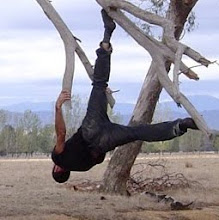After reading Masanobu Fukuoka's
The One-Straw Revolution I decided to conduct an experiment with our tomatoes this year. Fukuoka claims that no plant needs to be staked, pruned or manipulated in any way to give a robust crop. He maintains that just as with any natural farming or gardening system the quality of the soil is of utmost importance to improve productivity and keep pests at bay. He does add however that in the case of
already pruned or manipulated plants and trees, such as orchard fruit trees, intervention needs to continue because the risk of disease is high. He is suggesting here, although this is only my interpretation, that one can not easily make wild the cultivated and civilised. I guess this is the problem with an anti-ecological, pro growth-capitalist school system. It churns out young cultivated adults disembodied from wild systems and free-ranging, where wildness is replaced with contained, overly supervised play. The rise in self-harming among young people is possibly one manifestation of this containment.
This year I am planting several varieties of tomatoes through the garden, in various soils and in various sun and shade positions. I'm also staking some and leaving others to grow along the ground at their own will. So far the two strongest plants with fruit already on them are one of each. Both are growing in reasonably developed soil, that are heavily mulched and semi-shaded by our large oak tree. Indigenous grasses, forest gleaned microbes and humus, and horse manure have been added to the environment. So far, between the staked and free-ranging, it's pretty even, however I have more than fifty tomato plants growing, of varying varieties, and will stake half as they develop. Stay tuned for the results later in the season.

Above. Tomato (Grosse Lisse) staked.

Above. Tomato (Grosse Lisse) free-ranging.
 Above. Tomato (Grosse Lisse) staked.
Above. Tomato (Grosse Lisse) staked. Above. Tomato (Grosse Lisse) free-ranging.
Above. Tomato (Grosse Lisse) free-ranging.









2 comments:
About half my tomatoes last year were staked and half grew along the ground -- for me, the tomatoes on the plants that grew along the ground were eaten by slugs much more frequently, whereas the tomatoes on the staked plants mostly grew up and ripened intact. All kinds of things grew up alongside all the tomatoes, especially clover. I wonder why so many slugs ate the tomatoes along the ground -- and why they didn't touch the staked tomatoes. Maybe I need ducks....
hi jill, i just dipped into my 'companion planting' book (brenda little) and this is what she says about allaying slugs:
"Slugs like even ground over which to travel and have difficultly negotiating crumbly compost or a covering of bark. They betray their presence by their slimy trails which they leave behind on their night-prowls. They don't like freshly-limed ground or wood-ash or the bitterness left behind on the soil by watering with wormwood tea."
cheers,
patrick
Post a Comment